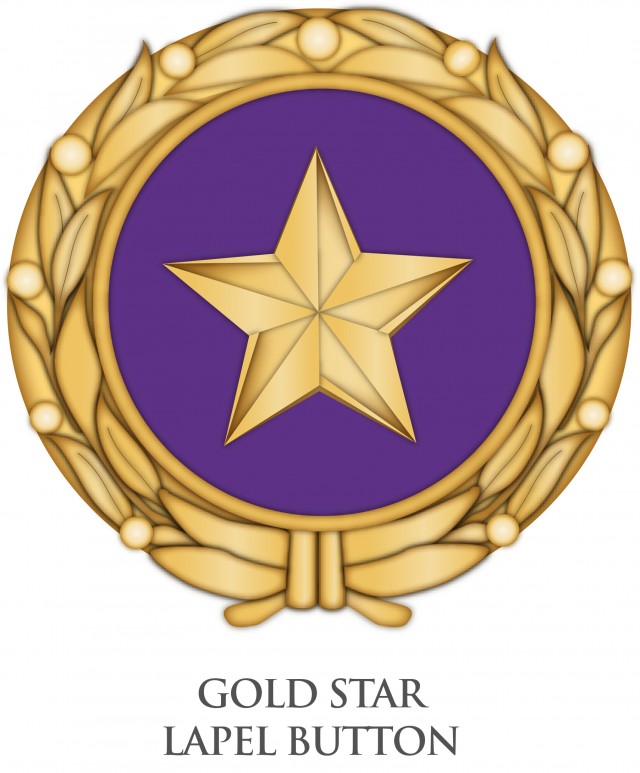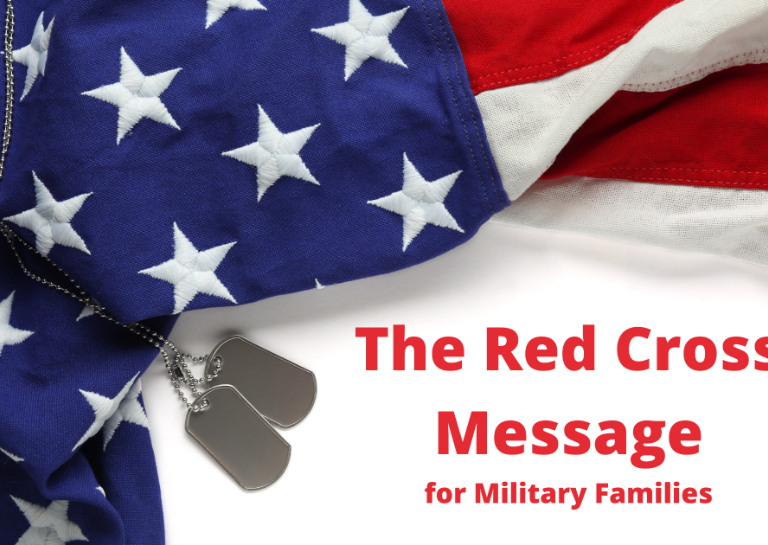 contributed by Liz Zaczek, senior staff writer
contributed by Liz Zaczek, senior staff writer
Gold Star Mother’s and Family’s Day, observed on the last Sunday in September each year, recognizes and honors mothers and families who have lost a child in the service of the U.S. military. In 1936, the 74th Congress declared, “the last Sunday in September shall hereafter be designated and known as ‘Gold Star Mother’s Day,’ and it shall be the duty of the President to request its obser
vance as provided for in this resolution.” Continuing the long-held tradition, in 2016, President Barack Obama proclaimed that September 25, 2016 was to be known as Gold Star Mother’s and Family’s Day, “I call upon all Government officials to display the flag of the United States over Government buildings on this special day. I also encourage the American people to display the flag and hold appropriate ceremonies as a public expression of our Nation’s gratitude and respect for our Gold Star Mothers and Families.”

Gold Star Lapel Pin
The Gold Star Lapel Button, also referred to as the Gold Star pin, is distributed to members of the immediate family of a fallen service member by the Department of Defense. The pin is distributed according to strict Department of Defense guidelines for service members who have lost their lives in a conflict or in support of certain military operations.
The Gold Star first made an appearance during World War I after being placed over a service flag’s blue star when a service member was killed in combat. The Gold Star signified the family’s pride in the loved one’s sacrifice rather than the mourning of their personal loss. The lapel pin displays a Gold Star with a purple back
ground surrounded by a gold wreath.

American Gold Star Mothers Inc. // Copyright https://www.goldstarmoms.com/
Shortly after World War I, the Gold Star Mothers Club was formed to provide support for mothers who lost sons or daughters in the war. The name came from the custom of families of service members hanging a Service Flag in their windows. The Service Flag had a star for each family member in the military embroidered on it. Living service members were represented by a blue star and those who were killed in action were represented by a gold star.
Gold Star Mother’s Day has been observed each year since 1936 by presidential proclama
tion, beginning with Franklin D. Roosevelt and continuing through to the present day. Beginning in 2009, the last Sunday in September, originally designated as “Gold Star Mother’s Day”, is now designated as “Gold Star Mother’s and Family’s Day” by
an annual presidential proclamation.
The National Gold Star Family Registry is the first comprehensive database of the United States’ fallen Heroes ever developed. The Registry not only affords family members the opportunity to publicly remember their loved one, but serves as a historical log of the country’s true heroes. By providing educational resources and personal accounts, the Registry ensures that future generations may know who these brave Americans were, not only how they died, but, more importantly, how they lived.
The information in the Registry is compiled from a number of different public sources including the Department of Defense and the National Archives. Adhering to Department of Defense guidelines for families who receive the ‘Gold Star Pin,’ the Registry only includes the names of heroes who have given their lives on the battlefield.
First launched in 2010, the Registry has been continually upgraded with the latest in technology and resources. This 21st Century memorial ensures that anyone anywhere can honor and remember the Heroes who have laid down their lives in defense of freedom. Whether they gave their life in Iraq, Afghanistan, Vietnam, Korea, WWII, or another conflict, the Registry is a place to ensure their memory will live on.
The surviving families of our fallen service members deserve the respect and honor that this day commemorates. Much like Memorial Day and Veterans Day, Gold Star Family Day is a chance to pay tribute and remember the sacrifices made by these courageous individuals and their families.
 https://mcnew.hmdev.org/wp-content/uploads/Sending-Care-Packages-to-Military-Members_-What-You-Need-to-Know-3.jpg
545
768
lauren
https://militaryconnection.com/wp-content/uploads/2018/09/mc-logo2.png
lauren2020-10-24 11:42:012021-03-17 18:52:48Sending Care Packages: What You Need to Know
https://mcnew.hmdev.org/wp-content/uploads/Sending-Care-Packages-to-Military-Members_-What-You-Need-to-Know-3.jpg
545
768
lauren
https://militaryconnection.com/wp-content/uploads/2018/09/mc-logo2.png
lauren2020-10-24 11:42:012021-03-17 18:52:48Sending Care Packages: What You Need to Know https://mcnew.hmdev.org/wp-content/uploads/Coping-with-Military-Deployment-–-Tips-for-Helping-Children-Before-Deployment.jpg
545
768
lauren
https://militaryconnection.com/wp-content/uploads/2018/09/mc-logo2.png
lauren2020-10-15 12:05:322021-03-17 18:52:48Coping with Military Deployment - Tips for Helping Children Before Deployment
https://mcnew.hmdev.org/wp-content/uploads/Coping-with-Military-Deployment-–-Tips-for-Helping-Children-Before-Deployment.jpg
545
768
lauren
https://militaryconnection.com/wp-content/uploads/2018/09/mc-logo2.png
lauren2020-10-15 12:05:322021-03-17 18:52:48Coping with Military Deployment - Tips for Helping Children Before Deployment https://mcnew.hmdev.org/wp-content/uploads/The-American-Red-Cross-Message.jpg
545
768
lauren
https://militaryconnection.com/wp-content/uploads/2018/09/mc-logo2.png
lauren2020-10-08 10:13:302021-03-17 18:52:48The American Red Cross Message
https://mcnew.hmdev.org/wp-content/uploads/The-American-Red-Cross-Message.jpg
545
768
lauren
https://militaryconnection.com/wp-content/uploads/2018/09/mc-logo2.png
lauren2020-10-08 10:13:302021-03-17 18:52:48The American Red Cross MessageThe lives of military children are marked by a unique culture and set of circumstances, oftentimes making them feel isolated from their non-military counterparts. The sacrifices these children make are easily overshadowed by the experiences of their active-duty family members. But make no mistake – a military kid has an inner strength like no other.
Coping with the deployment of one or both parents to war zones, frequent moves, living in cultures far different from their own – these types of experiences can set military children apart.
Studies show that there are some potentially positive outcomes of living a military life as a child. Military children tend to be very adaptable and resilient. They often have an increased cultural awareness and acceptance that can only come from connecting with various parts of the world first-hand. These kids tend to roll with the punches and shift gears with minimal stress because change is nothing new to them.
Of course, there are two sides to every coin. Along with the upsides of a military childhood come some potential struggles. The transitory lifestyle many military children live can hinder their ability to develop concrete relationships, which may be problematic both early on and later in life. Additional concerns can stem from the variations in availability of educational resources or even just educational paradigms within which military children must work as they move from place to place.
It’s fair to say that from a young age, this unique group of children faces challenges most civilians won’t ever have to navigate in their lifetime.
In an effort to honor the challenges faced and sacrifices made by our military kids, former Defense Secretary Casper Weinberger established April as The Month of The Military Child. Not only is this a month to focus on military child support via special programs and activities, it is a time to honor the incredible resiliency this group of young, unsung American heroes displays every day.
Where Can I Learn About The Month of The Military Child Activities and Events?
Many of this months’ events will be hosted or sponsored by military communities across the globe. Check with the Office of Public Affairs on base to get started. Military Readiness Centers, on-base Child Development Centers, and The Department of Defense Dependent School can also be great resources to learn how your community is celebrating.
Creative Ways to Celebrate the Month of The Military Child
Wear Purple – April 22nd is Purple Up! Day. This is the day for communities, military and non-military alike, to don purple in a show of support for military children. Purple indicates that all branches of the Military are represented.
Eat Purple – Similar to green foods on St. Patricks Day, prepare a purple meal to show your military kids that they mean the world to you. Food coloring can easily transform everyday foods or beverages into a special treat. Think purple milk, purple mashed potatoes, or purple rice. If you want to go the more natural route, try adding purple cauliflower, grapes, or berries to your military child’s plate.
Make a Video – Make a purple- or military-themed video in honor of The Military Child Month, and then share it on your social pages. TikTok is a fantastic platform for creating videos with all kinds of fun effects.
Use Facebook – Engage your community online! Ask your kiddo a military-inspired question and post his or her answer. Call on other military parents to do the same and ask them share their childrens’ answers in the comments. A few ideas:
Tap Into Hashtags – Don’t forget to tag your posts with the best military child hashtags around. Here are some to get you started:
Present an “Official” Thank You – Search the web for printable certificates in honor of Month of The Military Child, or just use this one. Fill in your military kid’s name, print, and present it to him or her in a creative way.
Decorate! – Celebrate your military child with a special space in your home. It could be his or her bedroom door, the kitchen bulletin board, a wall in your dining room or anyplace else they see regularly. Add photos of them with their military family member, mementos from different places they’ve lived, maybe even some military memorabilia that has meaning to them.
Resources for the Military Child (and Their Families)
Whether you are expecting your first or transitioning your last to college, there are a plethora of resources available to support military children and their families.
Military Kids Connect – A place for military kids to connect with each other. The site offers opportunities for children to develop and build relationships with friends who understand what it’s like to be part of a military family.
Focus Project – FOCUS (Families OverComing Under Stress) provides resilience training to military children and their families by teaching practical skills to help overcome common challenges. The program helps build on each child’s current strengths and teaches new strategies for communication, problem solving, goal setting, and creating a shared family story.
Military Installations New Parent Support Program – Helps military parents, including expectant parents, transition successfully into parenthood and provide a nurturing environment for their children. The program offers support and guidance for many of the unique challenges that face military families.
MilitaryChildcare.com – This secure DOD website provides a single location to find comprehensive information on military-operated and/or military-approved childcare programs worldwide. Once you create an account and household profile, you have access to all of these resources at any time from any location.
Military OneSource Digital Library – You’ll find ebooks and audiobooks on every topic imaginable. Also available are databases and reference books to help you learn a new skill and keep kids engaged.
Celebrate Your Military Child
There’s a reason that the dandelion is the unofficial flower of the Military Child. These incredible kids bloom everywhere the winds carry them. Regardless of how you choose to celebrate The Month of The Military Child, remember the goal is simple: remind military children across the world of how incredibly important they are to our country and to their families.
By guest contributor Chris Coleman
If you’ve ever done any research into the franchising environment, you may have noticed that many franchise companies offer Veterans a discount on their initial investment. Why is that? Well, there are a couple reasons why. First, this is a way for many franchisors to say ‘thank you’ for serving. Many of us feel you’ve gone above and beyond to protect our country and secure our freedoms. Second, there’s a general consensus that Veterans typically make great franchisees! Franchisors find that Veterans, with their leadership and teamwork skills and propensity for following a system, make ideal business owners in the franchise space. Let’s take a quick look at some of the reasons why Veterans are so sought after by franchise companies.
You can’t investigate this without first establishing a key finding. For many, that key finding would be the similarities that exist between franchise operations and the order and structure built into military service. We in the franchising industry know that a franchise is successful because the bedrock of its operation depends upon a defined set of principles and procedures that, when replicated, have a high chance of success. Our friends in the military community know that having a defined mission is essential to success; a successful mission, in turn, can usually be replicated, mitigating risk in future operations.
One example of those similarities is training. One of the key advantages of franchising is the amount of training and support that goes into the development of franchisees and their respective franchises. In the military, many of you began with basic training. In a franchise system, you may be required to attend their version of basic training, alongside other new franchise owners. Both are examples of an accelerated learning atmosphere where you’ll ramp up your knowledge of processes and procedures quickly. And we all know that the training doesn’t stop once you graduate from your basic course. The same goes for franchise support systems, all of which make ongoing education, training, and support a key ideological framework.
No discussion about Veterans and franchising would be complete without a reference to teamwork. If you’ve ever heard the phrase, “teamwork makes the dream work,” keep in mind that it applies to franchise operations as well as military training and execution. Much of our military organizational framework is built around groups and teams of men and women – troops, squads, platoons, regiments, divisions, and so on. Franchises rely on the same framework, the same type of top-down leadership as the military, to ensure the success of their operations.
The remaining similarities are no less obvious. The ability to thrive under pressure is a suitable quality in both a Veteran and a franchise owner…neither are strangers to long hours, hard work, and a payoff for effort at the end of the day. Lastly, discipline will always win the day…the military and our Veterans depend upon it and strong franchise brands demand it. In some sense, we can actually tie teamwork and discipline together – successful teams tend to have some sort of accountability structure in place and good franchise companies facilitate accountability groups throughout their system to encourage franchise owners to be all that they can be.
There are plenty of statistics that speak volumes about Veterans and small business ownership. From 2012 U.S. Census Bureau and Small Business Administration information, data suggests that approximately 2.5 million businesses – nearly 9.1% – were Veteran-owned. Within the small business ‘space’, franchising itself is a successful business platform for many Armed Forces Personnel – Veterans, Family members, National Guard & Reserve, and even Service Members on active duty. Many reports detail that approximately one in seven U.S. franchises is owned by Veterans. Did you catch that? One in seven franchises is owned by a Veteran! There must be a compelling reason for that statistic…
While there are a lot of synergies between franchises and the military, researching the nearly 3,600 franchise concepts can be tricky. If you or someone you know is a member of the military community looking to establish a business foothold in civilian life, I recommend connecting with a local franchise consultant to help navigate those waters. And don’t forget what they say – ‘teamwork makes the dream work’…
Chris Coleman is a second-generation franchise consultant & a franchise owner with over 20 years’ experience in the industry. He and his team provide no-cost consultations to individuals seeking business ownership opportunities. Chris currently owns franchise territory in 4 states, sits on the Board of Directors for FranNet, and serves as Vice-Chair of FranNet’s Franchise Advisory Council. Connect with Chris on LinkedIn here or visit FranNet.com for more information on franchising.
Do you have any experiences you’d like to share about your military-to-civilian transition? Anything that might benefit others in our military community, facing the same challenges? If so, email Kris@militaryconnection.com and tell us your story…

© 2006-2020 Military Connection, Owned by BL, LLC. All rights reserved